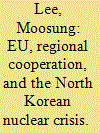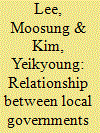|
|
|
Sort Order |
|
|
|
Items / Page
|
|
|
|
|
|
|
| Srl | Item |
| 1 |
ID:
148239


|
|
|
|
|
| Summary/Abstract |
North Korea poses a security threat by developing nuclear weapons. To address this source of regional insecurity, institutionalized frameworks of regional cooperation have been employed. Despite its usefulness as an alternative route to deal with the North Korean case, controversies still remain in terms of its relevance and effectiveness. Even so, the regional integration, consistently promoted by the EU as an integral part of its Asian policy, still requires systematic evaluation. This paper thus examines how and under which conditions regional integration can make a contribution to the transformation of the current crisis. In answering this question, it concludes that a long-term model-setting effect is hard to disregard, in spite of the mixed view of substantial compulsory and social learning effects. The underlying reasons are the ontological-seeking activities of North Korea, along with regional and global actors’ reservations about the contributions of the EU as a key security provider in Asian affairs and in its promotion of the regional integration scheme.
|
|
|
|
|
|
|
|
|
|
|
|
|
|
|
|
| 2 |
ID:
078665


|
|
|
|
|
| Publication |
2007.
|
| Summary/Abstract |
the EU and North Korea could have been expected. However, it was argued that the EU's position towards North Korea is likely to remain unchanged. Most of the existing studies ascribed the reactive attitude of the EU to the distinctiveness of the recent enlargement. The accession of a large number of new members, which are considered to have diverse foreign policy interests and perception, is likely to add up to the already overwhelming number of problems in the governance of the EU. Thus, the EU's policy towards North Korea would rather concentrate on a soft security approach. However, this paper contends that the existing explanation is not exhaustive, but that the implications relating to the conception of smallness, which is relevant to most of the new member states, should be included in the parameters of analysis in order to generate a more comprehensive and balanced view where the future relationship between the EU and North Korea is concerned.
The preliminary draft of this paper was presented at the International Conference of the Korean Society of Contemporary European Studies, November, 25, 2005, at Seoul, South Korea. I appreciate all the comments and helpful advice made at the presentation.
|
|
|
|
|
|
|
|
|
|
|
|
|
|
|
|
| 3 |
ID:
148236


|
|
|
|
|
| Summary/Abstract |
The promotion of regional integration is a core objective of the European Union’s (EU) foreign policy and has been seen as part of its attempt to transform international society and to make the world a more peaceful place to live. However, the success of this regionalization strategy has been limited and East Asia has been a particularly problematic case. This introduction raises some fundamental questions by first presenting some basic concepts so that the overall studies of the special issue can be systematically undertaken. The underlying questions are the following: How bleak is the picture with regard to regionalism in East Asia and the roles of the EU? Has the EU had no effect on the development of East Asian regionalism? And what potential does regional integration have in helping the transformation of conflicts in East Asia? In addition to these questions, it also discusses and conceptualizes underlying discourses on regional integration, conflict transformation, and regionalism in East Asia. By doing so, it aims to point out that the East Asia region is changing, the EU does play a role in this, and regionalization cannot be ignored as an institutional context that has the potential to assist conflict transformation, especially if windows of opportunity for such engagement arise in the future.
|
|
|
|
|
|
|
|
|
|
|
|
|
|
|
|
| 4 |
ID:
112431


|
|
|
| 5 |
ID:
066774


|
|
|
| 6 |
ID:
112464


|
|
|
|
|
| Publication |
2012.
|
| Summary/Abstract |
This paper examines the extent to which the European Union (EU) could be a normative power with the ability to define what passes for normal in a globalized world in its North Korean policy. In contrast with a rationalist view that limits the possibility of engagement and underestimates the implications of the EU's role in promoting North Korea's human rights conditions, constructivist-inspired approaches provide an alternative explanation by arguing that the pursuit of value-oriented policies is constitutive of actors' perceived normative identities. To this end, this paper investigates how humanitarian aid, institutionalized dialogues and multilateral approach are employed to endorse the EU's position as a normative power. In so doing, it also argues how and to what extent these normative operations are affected by its virtue, deontological and consequentialist ethics.
|
|
|
|
|
|
|
|
|
|
|
|
|
|
|
|
|
|
|
|
|